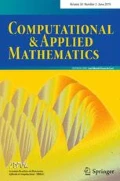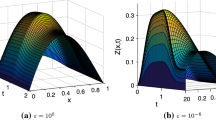Abstract
In this study, we consider the time-delayed singularly perturbed parabolic PDEs (SPPPDEs). We know that the classical finite difference scheme will not produce good results for singular perturbation problems on a uniform mesh. Here, we propose a new stable finite difference (NSFD) scheme, which produces good results on a uniform mesh and also on an adaptive mesh. The NSFD scheme is constructed based on the stability of the analytical solution. Results are compared with the results available in the literature and observed that the proposed method is efficient over the existing methods for solving SPPPDEs.



Similar content being viewed by others
References
Ansari AR, Bakr SA, Shishkin GI (2007) A parameter-robust finite difference method for singularly perturbed delay parabolic partial differential equations. J Comput Appl Math 205:552–566
Arino O, Hbid ML, Ait Dads E (2006) Delay differential equations and applications. Springer, Berlin
Bashier EBM, Patidar KC (2011) A novel fitter operator finite difference method for a singularly perturbed delay parabolic partial differential equation. Appl Math Comput 217(9):4728–4739
Cheng O, Jia-qi M (2005) The nonlinear singularly perturbed problems for predator-prey reaction diffusion equation. J Biomath 20(2):135–141
Das A, Natesan S (2015) Uniformly convergent hybrid numerical scheme for singularly perturbed delay parabolic convection-diffusion problems on Shishkin mesh. Appl Math Comput 271:168–186
Das A, Natesan S (2018) Second-order uniformly convergent numerical method for singularly perturbed delay parabolic partial differential equations. Int J Comput Math 95:490–510
Doolan ER, Miller JJH, Schilders WHA (1980) Uniform numerical methods for problems with initial and boundary layers. Boole Press, Dublin
Gowrisankar S, Natesan S (2017) \(\varepsilon \)-Uniformly convergent numerical scheme for singularly perturbed delay parabolic partial differential equations. Int J Comput Math 94:902–921
Kellogg RB, Tsan A (1978) Analysis of some difference approximations for a singular perturbation problem without turning points. Math Comput 32(144):1025–1039
Kumar D, Kumari P (2019) A parameter-uniform numerical scheme for the parabolic singularly perturbed initial boundary value problems with large time delay. J Appl Math Comput 59:179–206
Lange CG, Miura RM (1982) Singular perturbation analysis of boundary-value problems for differential-difference equations. SIAM J Appl Math 42:502–531
Miller JJH, Riordan EO, Shishkin IG (1996) Fitted numerical methods for singular perturbation problems. Word Scientific, Singapore
Murray JD (2001) Mathematical biology I: an introduction, 3rd edn. Springer, Berlin
Musila M, Lansky P (1991) Generalized ’s model for anatomically complex neurons. BioSystems 25(3):179–191
Peiraviminaei A, Ghoreishi F (2014) Numerical solutions based on Chebyshev collocation method for singularly perturbed delay parabolic PDEs. Math Methods Appl Sci 37(14):2112–2119
Roos HG, Stynes M, Tobiska L (2008) Numerical methods for singularly perturbed differential equations. Springer, Berlin
Salama AA, AI-Amery DG (2017) A higher order uniformly convergent method for singularly perturbed delay parabolic partial differential equations. Int J Comput Math 94(12):2520–2546
Shishkin GI (1989) Approximation of solutions of singularly perturbed boundary value problems with a parabolic boundary layer. USSR Comput Math Math Phys 29(4):1–10
Wang K, Wong YS (2014) Pollution-free finite difference schemes for non-homogeneous Helmholtz equation. Int J Numer Anal Model 11:787–815
Wang K, Wong YS, Deng J (2015) Efficient and accurate numerical solutions for Helmholtz equation in polar and spherical coordinates. Commun Comput Phys 17:779–807
Wu J (1996) Theory and applications of partial functional differential equations. Springer, New York
Xuefei H, Wang K (2018) New finite difference methods for singularly perturbed convection-diffusion equations. Taiwan J Math 22(4):949–978
Author information
Authors and Affiliations
Corresponding author
Additional information
Communicated by Frederic Valentin.
Publisher's Note
Springer Nature remains neutral with regard to jurisdictional claims in published maps and institutional affiliations.
Rights and permissions
About this article
Cite this article
Podila, P.C., Kumar, K. A new stable finite difference scheme and its convergence for time-delayed singularly perturbed parabolic PDEs. Comp. Appl. Math. 39, 140 (2020). https://doi.org/10.1007/s40314-020-01170-2
Received:
Revised:
Accepted:
Published:
DOI: https://doi.org/10.1007/s40314-020-01170-2




